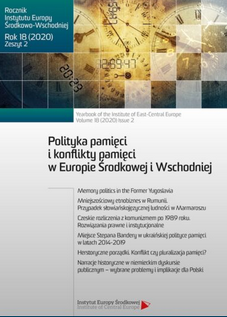Memory politics in the Former Yugoslavia
Memory politics in the Former Yugoslavia
Author(s): Vjeran PavlakovićSubject(s): Military history, Political history, Studies in violence and power, WW II and following years (1940 - 1949), Transformation Period (1990 - 2010), Inter-Ethnic Relations, Politics of History/Memory, Peace and Conflict Studies
Published by: Instytut Europy Środkowej
Keywords: memory politics; former Yugoslavia; commemoration; Second World War; Wars of Yugoslav Dissolution;
Summary/Abstract: This article provides an overview of some of the most prevalent topics in post-Yugoslav memory politics as well as on some of the scholars working on these issues, focusing on the commemorative practices of the Second World War and the wars of the 1990s. Thirty years after the Socialist Federal Republic of Yugoslavia’s disintegration, the discourse of post-war memory politics continues to dominate nearly all of the successor states, even though two of them have seemingly left the past behind to join the European Union. While the wars of the 1990s created an entirely new memory scape in the region, they also radically transformed the way in which each country commemorated the Second World War. Although the article examines in-depth the collective remembrance of sites of memory, such as Jasenovac, Bleiburg, and Knin, trends across the broader region are also addressed. The work of young scholars, as well as experienced researchers, who have introduced innovative approaches in memory studies in the former Yugoslavia, is highlighted to show how new studies focus on the cultural reproduction of dominant narratives in addition to top-down political discourse.
Journal: Rocznik Instytutu Europy Środkowo-Wschodniej
- Issue Year: 18/2020
- Issue No: 2
- Page Range: 9-32
- Page Count: 24
- Language: English

